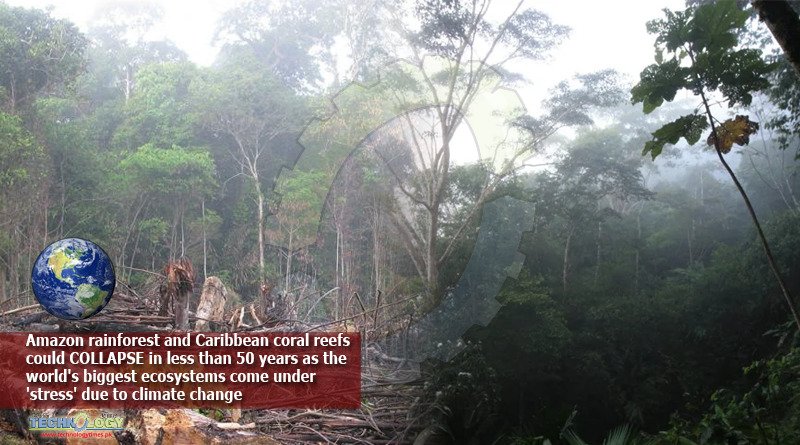The Amazon rainforest and Caribbean coral reefs could collapse completely within the next 50 years as climate change puts the biggest ecosystems under stress. Researchers from Bangor University in Wales used computer models to discover that ecosystems were collapsing at a ‘significantly faster rate’ than first thought.

They studied data from more than 40 natural environments around the world and fed them into a computer model to predict how ecosystems will change over time.
The team found that at the current rate of climate change the Amazon rainforest will become a savannah-type ecosystem in 49 years.
Lead author, Dr Simon Wilcock from Banger University said people need to prepare themselves for dramatic environmental changes ‘far sooner than expected’.
While currently lush and green, researchers predict the Amazon rainforest will become an African style savannah-type environment with grass and sparse tree populations
Writing in Nature Communications they say the stress being faced by places like the Amazon rainforest could lead to them transforming into ‘an alternative ecosystem’.
The prediction for the 2.1 million square miles of Amazon rainforest is that it will go from diverse greenery to an African style savannah with a mix of trees and grass.
Caribbean coral reefs, covering approximately 7,722 square miles of ocean, would become bleached and sparsely populated in just 15 years, the team predict.
‘Unfortunately, what our paper reveals is that humanity needs to prepare for changes far sooner than expected,’ said Willcock.
‘These rapid changes to the world’s largest and most iconic ecosystems would impact the benefits which they provide us with, including everything from food and materials, to the oxygen and water we need for life.’
Researchers from Bangor, Southampton University and the University of London collated data from four land, 25 marine and 13 freshwater ecosystems.
These varied in size from small ponds to the black sea aquatic ecosystem.
This data had been compiled from scientific publications, institutional reports and online databases about regime shifts and thresholds.
Their computer models found that larger ecosystems take longer to actually collapse but their breakdown, once started, happens quickly compared with smaller systems.
‘We intuitively knew that big systems would collapse more slowly than small ones – due to the time it takes for impacts to diffuse across large distances,’ said John Dearing of Southampton University, lead researcher on the study.
‘What was unexpected was the finding that big systems collapse much faster than you might expect – even the largest on Earth only taking possibly a few decades.’
Dearing says the unravelling effects that he and his team have highlighted are probably illustrated by the rapid spread of bush fires recently seen in Australia.
The findings also magnify concerns about the effects recent fires in the Amazon rainforest will have on its ability to withstand climate change, he said.
Researchers predict that the colourful Caribbean coral reef will become bleached and sparsely populated within 15 years
Not everyone felt the research merited the strong claim that the Amazon rainforest would turn into a completely new ecosystem in just 49 years.
Dr Erika Berenguer, a senior research associate at University of Oxford and Lancaster University, who was also not involved in the study, said its conclusions are not supported by the data analysed.
The claim that the Amazon will become a ‘savannah-type ecosystem’ was not tested in the paper so can’t be used as a valid example.
‘The authors use data from only four terrestrial systems, none of which is a tropical rainforest, but still claim that the Amazon, the largest rainforest on the planet, will experience a dieback in just 50 years,’ she said.
‘While there is no doubt that the Amazon is at great risk and that a tipping point is likely, such inflated claims do not help either science or policy-making.’
Dearing says the unravelling effects that he and his team have highlighted are probably illustrated by the rapid spread of bush fires recently seen in Australia
Dearing and his team found some light, they discovered that ecosystems made up of a number of interacting species, rather than those dominated by one single species, may be more stable and take longer to shift to alternative states.
They say these provide opportunities to mitigate or manage the worst effects areas.
For example, elephants are a termed a ‘key stone’ species as they have a disproportionately large impact on the landscape – pushing over trees, but also dispersing seeds over large distances.
The authors say the loss of key stone species, such as this, would lead to a rapid and dramatic change in the landscape within our lifetime.
‘This is yet another strong argument to avoid degrading our planet’s ecosystems; we need to do more to conserve biodiversity,’ says Dr Gregory Cooper from the School of Oriental & African Studies, University of London.
Courtsy: Refferal link
